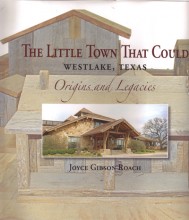The Little Town That Could - Westlake, Texas: Origins and Legacies details 160 years of settlement history in the Cross Timbers of Northeast Tarrant County surrounding Westlake. Primary resources, never before in print, are used to tell the story. Historical photos, documents, family narratives, cemetery rolls, and illustrations illuminate the fascinating history of this beautiful and unique region. Click to Download first page...
The Little Town that Could
"What a splendid achievement! In terms of both content and format this book earns its place among the outstanding contributions to county and local history." - Al Lowman, past president of Book Club of Texas and Texas State Historical Association and Fellow of TSHA
"Joyce Gibson Roach's The Little Town That Could goes well beyond its subtitle, 'Origins and Legacies.' The book - beautiful in all respects (text, photos, design) is a history of the town on the edges of Tarrant and Denton counties. And it is more. It traces the impact of such ranch owners as J. Glenn Turner and Ted Dealey in turning the unincorporated area west of Lake Grapevine into a town. It recaptures the past of eastern Tarrant County and southern Denton County and the arrival of western Dallas County on the land "that was ours," as one of the chapters is titled. Joyce Roach knows the land and the people, having spent much of her life in the region. More than that, she is a first-rate historian and folklorist, and both those disciplines figure largely in her wonderful history and legend that became Westlake, Texas." - James Ward Lee, Professor Emeritus, University of North Texas, foremost Texas literary critic and Fellow of the Texas Folklore Society
"It purports to be the story of tiny, prosperous Westlake, Texas (area: 6 square miles, population: around 700), but Joyce Gibson Roach's The Little Town That Could is much, much more - a wonderfully readable, informal history of the Cross Timbers area of North Texas, embracing parts of half a dozen counties including Denton, Dallas, Cooke, and Tarrant, where Westlake is located a stone's throw (or so) southwest of Grapevine Lake.
Roach’s narrative outlines the history of area, the development of which began as part of the Peters Colony in the 1840s, and details the growth of the communities and towns which occupied the area through history. It includes much social history, and there's not a dull page in the book, which is richly illustrated with period photographs and maps.
Of course, it does take the reader to the founding of Westlake in 1957 and the latter half of the book is most concerned with Westlake, which grew carefully and impressively with the guidance of half a dozen businessmen, among them J. Glenn Turner, a well-known Dallas attorney, and Edward Dicker, a prominent Dallas architect.
The book is beautifully designed and page layouts grab the reader's attention. Roach’s extensive bibliography and helpful chapter endnotes guide the reader to dozens of sources for more information.
It's a handsome book, but even better, it's important, informative, and highly readable." - Robert Compton, former book editor, The Dallas Morning News
"I must say I am much impressed with the beauty of the book and, even more so, with the way Roach weaves a fascinating narrative through a text chock full of recollections, documents, and illustrations. The book blurs the line between being a historical narrative and a primary resource. This seasoned author does a great job writing history that is engaging, readable, and accurate." - Gerald D. Saxon, Dean of the UT Arlington Library

